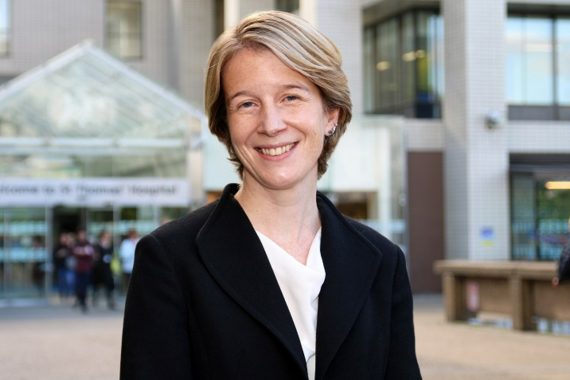Hospital providers must sort out working relationships with GPs, says NHS chief

Fixing the working relationship with primary care is one the key priorities for secondary care providers, who must not rely on GPs to do so, NHS England’s chief executive has said.
Addressing the NHS Providers conference in Liverpool yesterday, Amanda Pritchard went as far as listing this as one of five key priorities for secondary care managers, alongside living within their financial means and maintaining quality and safety.
According to Ms Pritchard, realisation of the Government’s ‘neighbourhood health service’ plan will rely on improving the ‘interface’ between primary and secondary care. Speaking to a room full of NHS managers, she noted that ‘frustrations can run both ways’ but warned that ‘relying on GPs to solve it won’t work and it’s not fair’.
Ms Pritchard said: ‘We have to make this work better for all parties, because it’s patients who suffer when it doesn’t. So we’re working on this centrally; looking particularly at streamlining referrals. But it’s about much more than that.
‘Patients unable to get information from hospitals, pushing them to GPs. Clinics asking GPs to refer to other clinics, to chase test results ordered by the clinic.’
She called on all providers to ‘commit to this now’ and said this is ‘particularly important as a first step to make integrated neighbourhood teams and neighbourhood services work’, as they rely on ‘well-functioning’ relationships.
NHS England’s five key tasks for secondary care providers
- Living within the money – making resources go as far as they can possibly go
- Embedding continuous improvement.
- Maintaining quality and safety.
- Working better with primary care (interface).
- And making the most of opportunities flowing from ability to act as ‘one NHS) – e.g. Federated Data Platform
Speaking today at the same conference, health secretary Wes Streeting said realising the new neighbourhood health service should be the key focus of ICBs going forward.
His speech focused on a number of reforms focused on provider performance, including trust league tables, but he also said ICBs would be measured on their ability to deliver neighbourhood services.
Suggesting ICBs are unclear on their ‘purpose’, he said: ‘I want ICBs to focus on their job as strategic commissioners and be responsible for one big thing: the development of a new Neighbourhood Health Service.
‘It will focus on building up community and primary care services with the explicit aim of keeping patients healthy and out of hospital, with care closer to home and in the home.’
Those ICBs making the most progress towards this goal should ‘enjoy greater freedom and flexibility’, the health secretary said.
Neighbourhood health models formed part of Labour’s manifesto which pledged to ‘reform’ primary care and trial ‘neighbourhood health centres’ to house GPs and other community health staff ‘under one roof’.
This model was also hailed as the way forward for the NHS in Lord Ara Darzi’s influential report, and following this, the RCGP pushed for ‘co-location’ of GP practices with other services.
A recent report by the NHS Confederation argued that the way GP services are contracted must change in order to deliver the Government’s plans for neighbourhood healthcare.
ICBs are already taking forward plans for neighbourhood working, largely based around the 2022 Fuller stocktake.
Pulse exclusively reported on North West London’s plans to introduce ‘integrated neighbourhood teams’ covering 50,000 to 100,000 patients.
Related Articles
READERS' COMMENTS [8]
Please note, only GPs are permitted to add comments to articles










Proof will be in the pudding, we can only maintain standards and push back wasteful, disrespectful and pointless requests back on to secondary care until they get the message.
Went to Oxford with Boris and the pig man. Resign
Same people, same ideas, same outcome.
Oxford clique, neighbourhood hubs run by hospitals, death of primary care.
Glad those pesky hospitals have been ‘told’. Everything will be for the best now!
Hospitals have no incentive to sort this out, this has beeen a problem for a very long time. It will only improve with enforcement and penalities for hospitals for workload dumping -unless this is done nothing will change.
might sound harsh… the only way to sort inappropriate transfer of workload is to set GMC on repeat offenders. Nothing else will work. They don’t care about any feedback, financial penalties affect the trust, not them personally. But ultimately what they do, how they behave,- potentially is a breach on guidance on professionalism and delegation.
I can remember many horrible examples of dumping, including where I sought to speak to the offender directly, they hid behind their admin team. Where I escalated matters to hospital management- nothing happens. So I should have, at least, once escalated it to GMC.
One case is enough to get them in line, I wellcome scrutiny and ready am ready to be corrected
A good start would be to stick to the medical maxim that they who order a test must be sent the report and hold 100% of the responability for acting on that result, or chasing it down if it does not cross their desk as expected. This particular rule is now so widely ignored that I’m certain serious harm comes daily to patients left cut loose from follow-up, reports being copied to all and sundry, all of whom assume somebody else is acting on them.
Perhaps something modelled on the ‘Communication Standards’ document which was supposed to have been enacted in Wales, but hospitals appear never to have got their copies – or maybe did not read them?